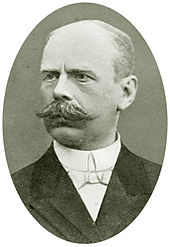Friedrich Robert Emanuel Baensch
Friedrich Robert Emanuel Baensch (born March 13, 1857 in Magdeburg , † September 11, 1928 in Magdeburg) was a publisher, printer operator and councilor .
Life
Baensch was born as the son of the Magdeburg print shop owner Bernhard Eugen Robert Baensch (born November 5, 1829 in Magdeburg; † June 21, 1863 ibid) and his wife Elisabeth Friederike Koch (born May 26, 1838 in Magdeburg; † October 14, 1910 ibid) . Friedrich Robert Emanuel Baensch had eleven siblings, including the printer and publisher Wilhelm von Baensch, who was raised to the nobility in 1871 .
Friedrich Robert Emanuel Baensch married Therese Weichsel (born February 28, 1862 in Magdeburg) on September 4, 1883 . The couple had two children:
- Robert Emanuel Baensch (born August 16, 1884 in Magdeburg, † October 1, 1917 in Tourcoing)
- Ruth Baensch (born May 8, 1888 in Magdeburg, † November 18, 1945 in Sudenburg )
education
In 1876 he graduated from the Magdeburg High School . However , he soon gave up studying law in Bonn and Heidelberg and learned the printing trade in Hanover in 1876 and 1877 . Baensch went on various trips abroad and acquired a good knowledge of Dutch , French and English .
Companies
As early as March 1878, when his father died early, Baensch took over his father's print shop . Here he carried out extensive expansions and modernizations, which led the company to supra-regional importance. Baensch expanded the print shop to include a publisher that initially dealt primarily with historical and genealogical works. The printing company, initially located in Magdeburg's Breiten Weg No. 19, was supplemented by a publishing bookstore in 1878, by a mechanized bookbindery in 1879, and by a poster institute and a type foundry in 1883 . As a technical innovation, Baensch introduced the printing of autotypes in 1882 and three-color printing in 1890 . At that time the company had 180 employees. A grant fund for sickness and death benefits was established in 1888, and later a widow's fund for the company's employees. The company site was expanded to include the Bärstrasse 8/9 site . The first setting machine was used in 1900. Electroplating and rotary and collotype printing were also introduced during this period . The Magdeburger Anzeiger and many official gazettes and regular publications appeared in Baenschs Verlag . In 1903 Baensch opened a company rest home in the saltwater pool in Salzelmen .
In 1910, Baensch's son Robert Emanuel Baensch became a partner in the company. However, like Baensch's son-in-law, he was killed in the First World War . The company was therefore converted into a family stock corporation in 1924 .
Social work
Baensch was very committed to society. From 1894 to 1919 he was a city councilor in Magdeburg. From 1907 to 1919 he was the head of the city council. Also from 1894 to 1919 he was a member of the Provincial Parliament of the Prussian Province of Saxony.
He belonged to the German Book Printers Association and was also a member of the Magdeburg Chamber of Commerce and board member of the book printers' guild . He was one of the founders of the lung sanatorium in Lostau . Baensch was chairman of the provincial association of the Prussian-Saxon Red Cross and the board of trustees of Bethanien. A special commitment was the promotion of the voluntary medical columns of the Red Cross. Baensch also strongly advocated the war clubs in the Magdeburg region and was chairman of the Magdeburg District Warrior Association for many years.
Honors
Baensch has received numerous awards. In 1905 he was appointed to the Royal Prussian Council of Commerce. The city of Magdeburg had temporarily named a street Baenschstraße in his honor.
literature
- Guido Heinrich: Baensch, Friedrich Robert Emanuel. In: Guido Heinrich, Gunter Schandera (ed.): Magdeburg Biographical Lexicon 19th and 20th centuries. Biographical lexicon for the state capital Magdeburg and the districts of Bördekreis, Jerichower Land, Ohrekreis and Schönebeck. Scriptum, Magdeburg 2002, ISBN 3-933046-49-1 .
- Hans Lülfing : Baensch, Emanuel Friedrich Robert. In: New German Biography (NDB). Volume 1, Duncker & Humblot, Berlin 1953, ISBN 3-428-00182-6 , p. 521 ( digitized version ).
Web links
Individual evidence
- ^ Ancestry.com. Magdeburg, Germany, Birth Register 1874–1903 [database on-line], Magdeburg Old Town Registry Office, Register Number 1302/1888
| personal data | |
|---|---|
| SURNAME | Baensch, Friedrich Robert Emanuel |
| BRIEF DESCRIPTION | German publisher |
| DATE OF BIRTH | March 13, 1857 |
| PLACE OF BIRTH | Magdeburg |
| DATE OF DEATH | September 11, 1928 |
| Place of death | Magdeburg |
